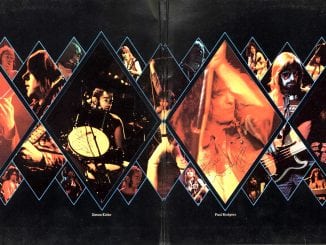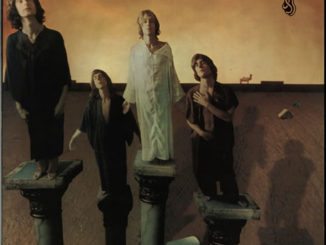Bowie’s Lazarus soundtrack contains three new songs from his final recording sessions. A first listen shows a great artist racing through a final burst of creativity

From the Guardian
“I’ve got a handful of songs to sing / To sting your soul, to fuck you over,” sings David Bowie on Killing a Little Time, one of three new songs on the album of his stage musical Lazarus. Now there’s a lyric to conjure with. It’s so playfully, poignantly appropriate for one of Bowie’s very last recordings that it’s hard to resist the idea that he is addressing us directly; that it’s a morbid showbusiness flourish from a dying man. But is that all there is to a Bowie song?
Bowie was never one for straightforward autobiography. His lyrics, even from a song as beloved as Life on Mars?, contain confounding twists and pockets of mystery. You can have a lot of fun guessing what they mean but you can never fully explain them. Before he died in January, Blackstar seemed to be yet another of his slippery, enigmatic creations, so it felt a little disappointing to see its array of possible meanings reduced, upon his passing, to a deathbed address. Confirmation bias led listeners to literalise any line that was remotely death-related and downplay the rest. The theory that this was a calculated farewell was alluring and not without foundation but it was suspiciously neat, given what we know about his art.
The Lazarus material really is the last word. Here are the final three songs recorded by a titanic artist whose death triggered a volcano of grief, so how could we not comb them for clues? But they are also components of a long-dreamt-of musical about Thomas Jerome Newton, The Man Who Fell to Earth. Of course, Bowie seemed to mindmeld with Walter Tevis’s creation at one psychologically fraught point in the mid-70s – the covers for Station to Station and Low both used stills from Nicolas Roeg’s movie; cocaine has a way of making one identify with an emotionally numb alien far from home – but still, there was, and is, a difference between the singer and the character. These songs were written for actors to sing, so interpret with caution.
They are by no means offcuts. Posthumous material often resembles a scrawny cigarette, scraped together using strands of tobacco from the butts in the ashtray. But these songs are as fully realised as anything on Blackstar. Indeed, they were recorded at the same time, with the same band and producer, and give the same impression that Bowie was on one last hot streak.
Each one has its own flavour. When I Met You is the kind of briskly anthemic, self-quoting rock that Bowie delivered on his 2013 comeback album The Next Day, climbing a ladder of chords to a stirring chorus, until a swarm of overlapping backing vocals knocks it sideways, giving it a stranger, more chaotic quality. Killing a Little Time has the same neurotic momentum as Sue (Or in a Season of Crime) and a touch ofOutside’s 1990s industrial clamour, pitching Bowie’s sinisterly theatrical vocal into shrieking, churning jazz-rock. Mark Guiliana’s astonishing, tentacular drumming alone confirms that Bowie’s last band, led by saxophonist Donny McCaslin, was one of his best, capable of anything. Bowie sounds like a man coming apart — “I’m falling, man / I’m choking, man / I’m fading, man” — but it feels like Newton talking. Bowie is just the cracked actor.
The best of the three, No Plan, is also the one most likely to inspire literal readings. It’s an exquisitely lush, star-speckled torch song, which refracts the late-in-life stocktaking of Piaf or Sinatra through the stasis and fatalism of Talking Heads’ Heaven. “All the things that are my life / All my moves, my beliefs, my designs / Me alone, nothing to regret / This is no place but here I am / This is not quite yet,” Bowie croons. Taken alone, it would be a hell of a swansong (“Am I nowhere now?”) but play it beside the feverish discontent of Killing a Little Time and it loses its soothing finality. Again, these are numbers from a musical. They might feel movingly true at times but they’re stories, from a master storyteller.
For a fan, these three songs reignite that January sadness, but they also underline what Blackstar implied, which is that Bowie wasn’t winding down but racing as fast as his health allowed through a final burst of creativity that was cut short too soon. And they provide a more ambiguous finale to a consistently surprising career. If you retrospectively found closure in Blackstar, then you’ll discover a more open ending here: loose threads to unravel that suspicious neatness. Their artistic vitality will, as promised, sting your soul. It will fuck you over.
If you’re looking for rare Bowie vinyl, CDs, memorabilia and more – be sure to visit the David Bowie Collectors Store at eil.com to see our huge range of all things Bowie




Be the first to comment